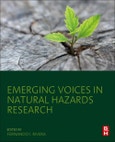Emerging Voices in Natural Hazards Research is intended to serve as a consolidated resource for academics, students, and researchers to learn about the most pressing issues in natural hazard research today.
Please Note: This is an On Demand product, delivery may take up to 11 working days after payment has been received.
Table of Contents
1. Bug out bags and first aid kits: Undergraduate college students' awareness, perceptions, preparedness, and behavior around severe weather 2. The gender dimensions of the 2013 Southern Alberta floods 3. Morphometric conditions underpinning the spatial and temporal dynamics of landslide hazards on the volcanics of Mt. Elgon, Eastern Uganda 4. Disaster recovery among older adults: Exploring the intersection of vulnerability and resilience 5. Hurricanes, disasters, and food insecurity: The intersection of two social events 6. Homelessness and inequality in the U.S.: Challenges for community disaster resilience 7. Hazardous or vulnerable? Prisoners and emergency planning in the U.S. 8. The recovery process: The standard used to measure Emergency Management effectiveness in the eyes of the public 9. Institutions of higher education 10. Institutionalizing nonprofit influences post-disaster 11. Gender and representative bureaucracy: A qualitative look at opportunities and barriers for women in local emergency management agencies 12. Natural hazards, resilience, and sovereignty: The case of Puerto Rico and the U.S. Virgin Islands 13. People with disabilities: Becoming agents of change in Disaster Risk Reduction 14. Young, mobile, but alone in the cold and dark: Experiences of young urban in-migrants during extreme weather events in the UK 15. Social vulnerability and individual wellbeing: An empirical analysis of first responders in South Korea 16. How do the perceptions of natural hazards influence migration decisions among ethnic minority farmers? Insights from coastal Bangladesh








